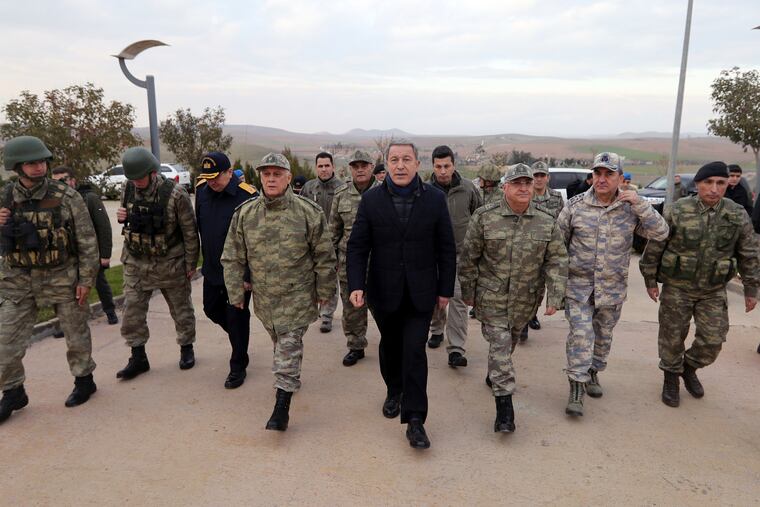Fighting among rebels in northern Syria kills dozens
Fighting in rebel-held parts of northern Syria has killed dozens of people as al-Qaida-linked militants press their offensive against Turkey-backed rebels

BEIRUT (AP) — Two days of fighting in rebel-held parts of northern Syria killed dozens of people as al-Qaida-linked militants press their offensive against Turkey-backed rebels, a war monitor and activists said Wednesday.
The new wave of fighting comes after President Donald Trump's abrupt announcement in mid-December that he was withdrawing 2,000 U.S. troops from Syria and Turkish threats to carry out a military operation against Kurdish fighters.
With their offensive, the al-Qaida-linked fighters are trying to cut off Turkey-backed fighters in the northern enclave of Afrin from those in the northwestern province of Idlib, amid concerns that Turkey might make a deal with Russia at the expense of the extremists, said Rami Abdurrahman who heads the Britain-based Syrian Observatory for Human Rights.
"They are trying to say we are present and no one should ignore us," he said of the al-Qaida-linked fighters.
The al-Qaida-linked Levant Liberation Committee and the Turkey-backed Nour el-Din el-Zinki group blamed each other for triggering the fighting, the worst in nearly three months.
The Observatory said two days of fighting in the provinces of Aleppo and Idlib have killed 31 people, including five civilians. Also killed were 14 al-Qaida-linked fighters and 12 Turkey-backed gunmen.
The government-controlled Syrian Central Military Media said al-Qaida-linked fighters are now in full control of the strategic town of Daret Azzeh and have also captured the villages of Kafrantin, Fadra, Houta and Mkalbis.
The Levant Liberation Committee said Nour el-Din el-Zinki militants shot dead five people, including four of its fighters, last week. It added that a local court released an official with the Nour el-Din el-Zinki after questioning him leading to tensions in the area.
Abdurrahman said al-Qaida-linked HTS took the killing as a pretext to launch its attack.
Also Wednesday, French President Emmanuel Macron said the fight against terrorism in Syria and the Mideast must continue. The remarks came in a phone call with Russian President Vladimir Putin. According to a statement from the French presidency, Macron called on "avoiding any new destabilization" in the region.
Separately, the Syrian Defense Ministry said a group of Kurdish fighters stationed in the Manbij area in northern Syria has pulled out, a report that was confirmed by the opposition and the Observatory. The Kurdish militia in the flashpoint area had no immediate comment.
The government and the Observatory said more than 200 fighters Kurdish fighters left Manbij.
The Turkish government has threatened a military offensive in Manbij to dislodge the U.S-backed Kurdish fighters because it calls them an extension of a Kurdish insurgency in Turkey and a threat to its national security.
The Defense Ministry said the withdrawal of the Kurdish fighters comes as part of an agreement to restore "normal life" to the areas in the north. It was not immediately clear if U.S. troops in the area had also redeployed. U.S. patrols and bases were rolled out in Manbij to prevent friction between the Kurdish militia and Turkey.
The Syrian government said shortly after U.S. President Donald Trump said he was ready to withdraw U.S. troops that it was deploying its troops to Manbij. The government troops later withdrew from edges of Manbij after the U.S.-led coalition urged all parties to respect "the integrity of Manbij."
The area has been bracing for an expected race between Turkish troops and allied Syrian fighters and government forces to fill a void left by the American troops.
Russia, a main backer of the Syrian government, is in talks with Turkey on future moves in Syria. The Turkish leader has said if the Kurdish militia leaves the area, Ankara will have no more business there.
_______
Associated Press writer Sarah El Deeb contributed to this report from Beirut.